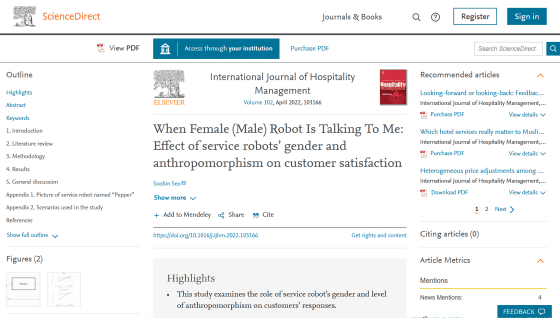Research results show that hotel employee robots prefer female robots to male robots

In recent years, the introduction of robots is progressing not only in the manufacturing industry but also in the service industry, and there are cases where robots are in charge of serving food at restaurants and reception at hotels. Of course, robots do not have biological gender differences, but according to a study conducted by researchers at Washington State University in the United States, there is a tendency that female robots are more likely to be preferred than male robots. It became clear.
When Female (Male) Robot Is Talking To Me: Effect of service robots'gender and anthropomorphism on customer satisfaction --ScienceDirect

People prefer interacting with female robots in hotels – WSU Insider
https://news.wsu.edu/press-release/2022/02/03/people-prefer-interacting-with-female-robots-in-hotels/
The hotel industry has been plagued by high turnover issues even before the pandemic of the new coronavirus infection (COVID-19). Assistant Professor Soobin Seo of Washington State University points out that some hotels have promoted automation and robotization in various areas such as dishwashing, room cleaning, guest reception, and luggage transportation.
Therefore, Mr. Seo presented 'a fictitious scenario in which a service robot responds at a hotel' to about 170 subjects and conducted a survey to have them evaluate the scenario. This scenario is 'Meeted by a male robot named' Alex 'who has a human-like face and body' 'Meeted by a female robot named' Sara 'who has a human-like face and body' ' It is divided into four types, 'Men's type but greeted by a robot with an interactive screen on the face' and 'Female type but greeted by a robot with an interactive screen on the face', and each subject is one type. He said he was shown only the scenario.
When we asked the respondents to rank their feelings when responding to the robot, the subjects who responded to the female robot were more comfortable and satisfied than the subjects who responded to the male robot. I tended to say that I was doing it. Seo also found that among female robots, the type with a face close to a human has a higher rating than the screen type.

'People tend to feel more reassured by having women take care of them, because of their existing gender stereotypes in the service industry,' Seo said of the findings. People's stereotypical view of gender also applies to robots, pointing out that the closer the robot is to humans, the more the effect will be amplified.
As more and more hospitality workers replace robots in the future, Seo argues that there will be an increasing need to do research on robots being gendered. Seo is also investigating the effects of factors such as the sociability and personality of AI robots on people's perceptions.
'In the future, more robots may appear in hotels and restaurants to replace human employees. Then, the psychological relationships seen in human relationships can be seen in the interaction with robots. You may be able to see it, 'Seo said.

Related Posts:
in Science, Posted by log1h_ik







